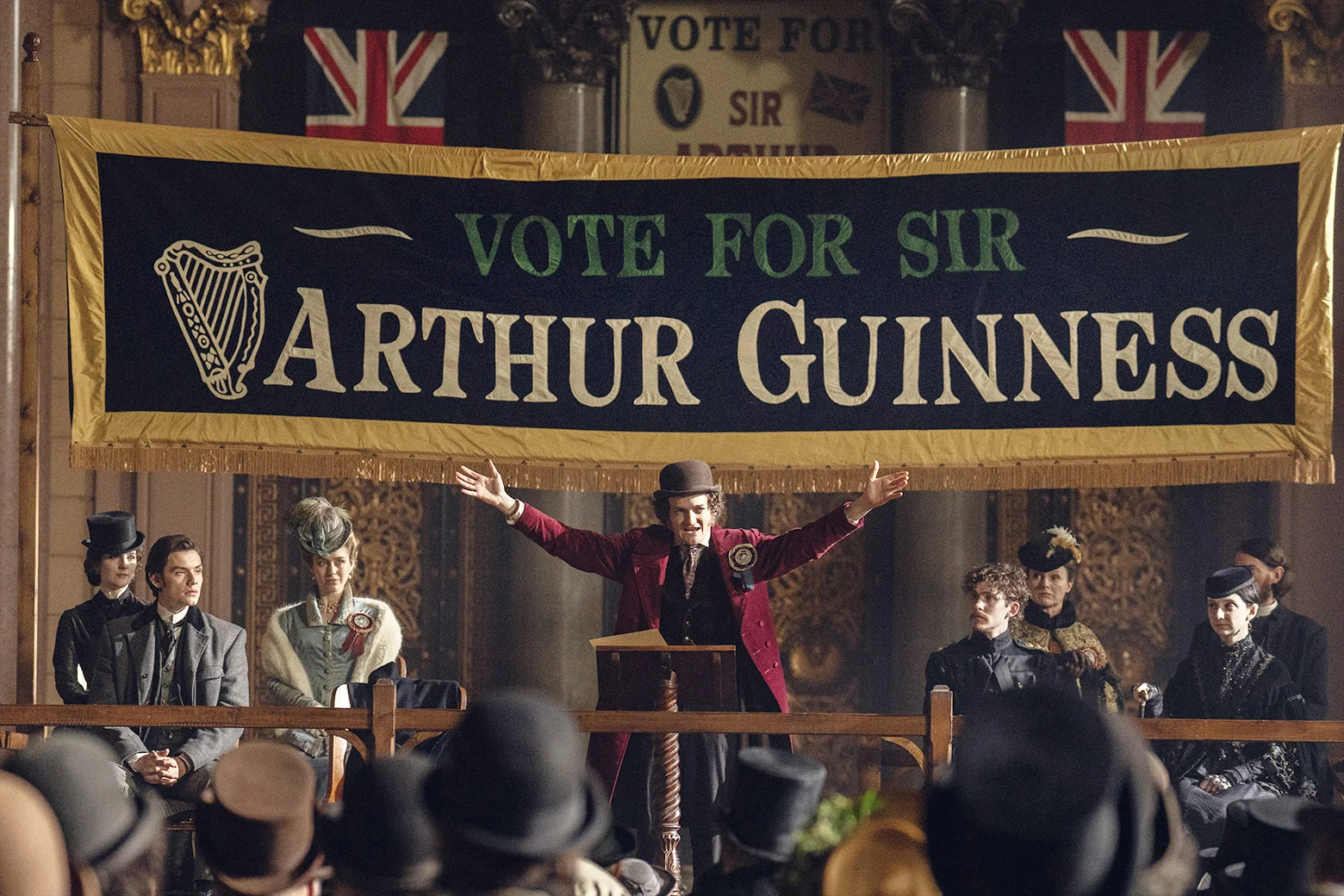
This article contains spoilers for House of Guinness.
You can just see the light bulb going on over the Netflix executives’ heads when they heard the pitch: “A late-Victorian family determined to maximize their money and power? Warring siblings vying for control of the patriarch’s empire? Sign us up!” The new House of Guinness series, based on the true rise and rise of the Dublin-based brewing family, bears the hallmarks of creator Steven Knight’s muscular storytelling as seen in his earlier shows like SAS Rogue Heroes and, especially, Peaky Blinders—fast-moving, extended action sequences, lashings of sex and fighting, and anachronistic musical scores incorporating metal and rap. The dialogue is similarly anachronistic, with f-bombs being dropped right, left, and center, even by well-brought-up Victorian Irish young ladies (a clear invention right off the bat—99.9 percent would not have even known the word existed).
Like Peaky Blinders, the series features an enigmatic, self-contained, ridiculously good-looking figure not averse to a bit of ultra-violence. In HOG this is Rafferty (James Norton), the Guinnesses’ factory foreman/head of security/enforcer/lust object of the Guinness ladies. Unfortunately for Knight, the real mid-Victorian Guinnesses were not gangsters, nor did they lead particularly colorful private lives, so he has had to do a certain amount of embroidering (each episode starts with the disclaimer “This is a fiction inspired by true stories”). However, it’s likely the current Guinness management didn’t object to a bit of besmirching past company directors’ respectability in return for the show’s orgy of product placement.
Although Episode 1 begins with four squabbling siblings mourning the death of the Guinness paterfamilias and wondering how the empire will be divided up in the will, they are not, like Succession’s Roys, all fiercely determined to gain sole control. Arthur (Anthony Boyle) (whom we will call Arthur 4 to distinguish him from his great-grandfather, the company’s founder Arthur 1; his grandfather Arthur 2; and his uncle, Arthur 3) really has his heart set on politics. Anne (Emily Fairn)—being a woman of the 19th century—is, unlike Shiv Roy, resigned to being out of contention due to her gender and aims instead to devote her time and share of the family fortune to Good Works and improving the lives of the poor. The youngest, Benjamin (Fionn O’Shea), is struggling with substance abuse and possible mental illness. The only sibling who is totally devoted to the brewery business is the second son, Edward (Louis Partridge), and the others, recognizing how good he is at it, are pretty relaxed about leaving him to it—though he and Arthur 4, having been left jointly in charge, do have some initial tussles over control.
To compensate for this lack of dynastic intrigue, Knight throws in some geopolitical tension in the form of the Guinnesses’ involvement (or lack of same) in Irish sectarian politics. At any rate, we take a look at what’s fact and what’s fiction in this dark, heady Irish brew.
Was Arthur Guinness (No. 4) Gay?
After returning home for his father’s funeral, Arthur 4, who has been living in London for the last five years, tells his lover he must remain in Dublin or be disinherited. They decide a long-distance relationship will be too difficult and agree to split up. Arthur’s proclivities soon create a problem for the wider business when Bonnie Champion, a local gangster, recalls the young millionaire patronizing a gay brothel he operates and demands £5,000 to keep quiet. As well, Ellen Cochrane (Niamh McCormack), a young activist for the Irish Brotherhood, a nationalist organization which is fighting for Irish independence from Britain, also has proof of Arthur’s homosexuality, but instead of money, she wants a commitment from him to support their cause in Parliament when he takes over his father’s seat in the House of Commons as the member of Parliament for Dublin. This is far more threatening to Arthur than just paying up.
Hoping to bolster his respectability, he marries Olivia (Danielle Galligan), the daughter of the Earl of Bantry, who very much looks down on her new husband’s family because their money was made “in trade” (money made in business as opposed to from owning land being considered very déclassé), even as it is restoring her family’s fortunes. Very much a realist, Olivia goes into the relationship aware that it is a marriage blanc, an arrangement whereby both parties commit to the marriage for social and dynastic purposes but avoid physical intimacy. Against the odds, the marriage turns out to be very happy as Olivia and Arthur find they really understand each other. Much to brother Edward’s displeasure, Arthur soon goes back to taking risks, renting a love nest in a rough part of town to meet his latest flame, Lord Arthur Clinton, who he “met at Eton.”
Corroboration for whether Arthur 4 was in fact gay is thin on the ground, although Irish writer Joe Joyce, author of a history of the family, asserted that Arthur was “probably” gay, noting that his marriage was “an unconventional one where it was agreed in advance it would not involve sex.” Joyce nevertheless characterized it as “a happy but childless marriage.”
It seems likely the show is creating a composite of Arthur 4, whose homosexuality was very much on the down-low, with his uncle Arthur 3 (known as Arthur Lee), who wasn’t much concerned with concealing his inclinations, which ended up embroiling him in a notorious scandal. At the age of 42, Arthur 3 was unmarried and living in a lavishly decorated apartment on the brewery premises described by an American relative in 1840 as “crowded with knick-knacks, statuary, paintings, stuffed birds etc. His drawing room is furnished in Chinese style and most richly.” As if this wasn’t enough of a giveaway, he sealed his letters with a stamp depicting a young Greek god.
In 1839, the brewery hired 18-year-old Dionysius Boursiquot, who later became a famous playwright and actor-manager. The 1950s Guinnesses destroyed records of Arthur 3’s relationship with Boursiquot, but it appears Arthur 3 was issuing promissory notes on the business and giving the proceeds to Boursiquot, either as hush money or as an incentive to leave town. At any rate, Boursiquot turned up in London in 1840 with enough money to entertain lavishly while Arthur 3, after the scandal almost brought down the company, had to give up his position as a Guinness director and move to a country house outside of Dublin where he lived “moderately.” Even so, he could not give up his taste for over-the-top décor, filling his new residence with embroidered silks, ivories, carved teak, and bronze gods.
Lord Arthur Clinton was a real person, the son of a duke and a central figure in an even more notorious homosexuality-related scandal, although there’s no record of him being involved with Arthur 3 or indeed Arthur 4. He was elected as a member of Parliament in 1865 but was declared bankrupt (with debts reported to total £5.78 million in today’s money) only three years later and resigned. Shortly thereafter, he started living with and describing himself in love letters as the husband of Ernest Boulton, who from a young age had been dressed as a girl by his mother and is worth a miniseries unto himself.
Boulton toured the U.K. as part of a theatrical double act with his friend Frederick Park, dressed as women and appearing under the stage names Stella Clinton and Fanny Winifred Park. They attended the theater and social events in London sometimes dressing as men and sometimes as women. But then in 1871, they were charged with “conspiring and inciting persons to commit an unnatural offence.” They were ultimately acquitted after the prosecution failed to establish that they had had anal sex, which was a crime. Nor could the prosecution establish that their wearing women’s clothing was in any sense a crime. And people say the Victorians were staid.
Did Guinness Give 15 Percent of Its U.S. Profits to Irish Nationalists?
As Edward is plotting how to expand Guinness’ profile and sales in America, he is unexpectedly visited by a somewhat eccentric smooth-talker called Byron Hedges (Jack Gleeson) who claims he can act as the beer’s “international vanguard.” With a Guinness mother and a father who was a Fenian and was killed fighting for the cause, Hedges feels he can serve as a bridge between the brand, which is perceived as a major backer of the Protestant minority that supports continuing British control of Ireland, and the majority-Catholic Irish Americans, who largely support Irish nationalism and back the Fenians. Hedges points out that without Fenian support, Irish longshoremen in Boston and New York will not unload the shipments of beer. He gets the job and, as part of his negotiations, promises the Fenian Brotherhood in the U.S. 15 percent of Guinness’ profits from stateside sales.
This seems highly unlikely if only because Guinness already had a strong presence in the U.S., thanks to a distribution partnership with the E. & J. Burke company, which became the exclusive importer for Guinness Stout in the United States in 1849. Even before then, Arthur 2 (Edward’s grandfather) had started shipping to New York and South Carolina in the early 1800s. The Fenian movement, which advocated the use of force to establish an independent Irish republic, has its roots in the Irish rebellion of 1798. It evolved into two wings: the Irish branch known as the Irish Republican Brotherhood, a small, secret organization dedicated to establishing an independent Irish republic by any means necessary, and the American branch, known as the Fenian Brotherhood. Both were established in 1858 (though originally conceived in the revolutionary Paris of 1848), a decade after Guinness had started being distributed in America.
There is no evidence that Edward Guinness supported the Fenian cause. On the contrary, he was staunchly Unionist and gave financial support to the Irish Unionist Alliance and the Ulster Volunteer Force. Today he would no doubt be condemned as a centrist, but he sought to promote Ireland’s interests within the framework of its union with Great Britain and to find a moderate solution to Irish self-governance.
Was Arthur 4 Really Kicked Out of Parliament for Buying Votes?
Arthur 4 decides to run for a seat as Dublin’s MP in the British Parliament but is concerned that he may not win because of his perceived Unionist sympathies when so many voters are Catholic Nationalists. He employs Rafferty to rig the election by giving supportive voters a ticket they can exchange for £5. The scheme works, and in 1868 Arthur 4 is duly elected. However, the fraud was just too visible, and even though Arthur 4 avoids being found personally responsible by blaming it on his staff, he is nevertheless booted out of Parliament after just a year.
This actually happened. Arthur 4 won the seat but then lost it after one of his opponents brought a court case which family historian Joe Joyce writing in the Irish Times said “revealed an extraordinary level of voter bribery (£5 a vote) by his agents, who were up to dirty tricks that would leave the most Machiavellian modern party manager in awe.” Despite this, in 1874 Arthur 4 returned to Westminster after the next election.
Did Edward Add the Irish Harp to the Guinness Label?
As part of courting the large Nationalist market, Edward proposed adding an image of “the harp of Brian Boru” to the beer’s label, Brian Boru being an 11th-century high king of Ireland. Arthur 4, who shares their father’s strong Unionist sympathies, is totally opposed but Edward points out that Fenian support will save the brewery financially, tamp down the rumors about Arthur’s sexuality, and enlarge Arthur’s political base.
In fact, the harp was added to the label in 1862 by Edward’s father, Benjamin Lee. The image is based on a medieval harp in Trinity College, Dublin, which does not date back to the time of Brian Boru but rather is thought to be a late-14th or early-15th-century copy of an 11th-century harp.
Nor was Edward the first Guinness to reach out to the Irish Nationalists. The company’s founder, Arthur 1, personally hired Catholics for his brewery when it was founded in 1759, unusually for the time. He also promoted traditional Gaelic arts to help preserve Irish identity and worked to reduce the prevalent religious polarization. But he publicly opposed the Irish Rebellion of 1798, earning the ire of Nationalists, who subsequently referred to the beer as “the black Protestant porter.” His son Arthur 2 subsequently advocated for Catholic emancipation so Catholics would no longer be barred from entering certain professions and for full Catholic voting rights.
Guinness was renowned for treating its employees well, offering innovations like pensions, a health plan, and subsidized meals. However, there were few if any Catholic managers until the 1960s, and as late as 1939, a Guinness brewer intending to marry a Catholic would be asked to resign.
Did Anne Guinness Have a Miscarriage in a Coach?
Anne is traveling in a horse-drawn coach down a bumpy rural road to Ashford Castle in Galway, one of the Guinness properties, when she notices blood on the floor. The carriage is forced to stop in Cloonboo, a deprived village, where a local healer and wise woman tries to save Anne from suffering a miscarriage. Anne, who hadn’t realized she was pregnant, is worried the baby might be the result of a moment of passion with the brooding Rafferty rather than the child of her husband, a peer and clergyman.
Since Anne Guinness Plunket had already had a son in 1864, it is highly unlikely she didn’t realize she was pregnant. And it’s even more unlikely she was pregnant as the result of a booty call with Rafferty, since he is a fictional character.



